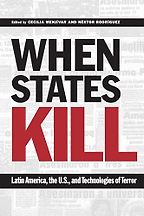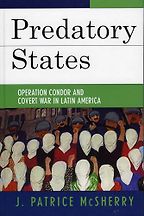Books by Cecilia Menjívar
“This is an edited volume looking at the establishment of a system of repression in Latin America, starting in the 1960s and going into the 1990s, from the Cold War to the War on Drugs. The argument made is set within (neo-)Marxist approaches to international relations. It suggests that the system of repression is established either at the direction of or with the complicity of the United States—understood correctly as the hegemon or dominant power—in order to maintain a system of economic and financial exploitation of Latin America. I find the argument quite persuasive, but whether one buys into this overall theoretical framework or not, is beside the point. The chapters themselves are incredibly detailed, and they provide some of the best analysis I’ve seen of the repression conducted by several countries in Latin America and of the rationales behind this repression.” Read more...
The best books on State-Sponsored Assassination
Luca Trenta, International Relation
Interviews where books by Cecilia Menjívar were recommended
-

1
Predatory States: Operation Condor and Covert War in Latin America
by J. Patrice McSherry -

2
Rise and Kill First: The Secret History of Israel's Targeted Assassinations
by Ronen Bergman -

3
Putin's Killers: The Kremlin and the Art of Political Assassination
by Amy Knight -

4
Do Not Disturb: The Story of a Political Murder and an African Regime Gone Bad
by Michela Wrong -

5
When States Kill: Latin America, the U.S., and Technologies of Terror
by Cecilia Menjívar & Néstor Rodríguez
The best books on State-Sponsored Assassination, recommended by Luca Trenta
The best books on State-Sponsored Assassination, recommended by Luca Trenta
Political assassinations are usually portrayed in the media as the actions of rogue states acting recklessly, outside the bounds of international law. But it is far more common than you might think, says Luca Trenta—international relations expert and the author of The President’s Kill List. Here, he recommends five books on state-sponsored assassinations and explains how different countries have justified, denied or redefined the practice.




